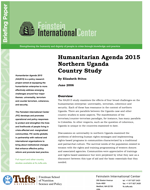The HA2015 study examines the effects of four broad challenges on the humanitarian enterprise: universality, terrorism, coherence and security. Each of these has resonance in the context of northern Uganda. There are parallels between the Uganda case and other country studies in some aspects. The manifestation of the terrorism/counter-terrorism paradigm, for instance, has many parallels to Colombia. In other respects, such as the question of coherence, Uganda is unique in the countries examined to date.
Humanitarian Agenda 2015: Northern Uganda Country Study

ASSOCIATED PROJECT
SUBJECTS
PUBLICATION TYPE
LOCATION

RELATED PUBLICATIONS
This briefing describes the key elements and issues associated with conflict in pastoralist areas across sub-Saharan Africa.
•
Ce document d’information décrit les éléments clés et les enjeux associés aux conflits dans les zones pastorales d’Afrique subsaharienne.
•






